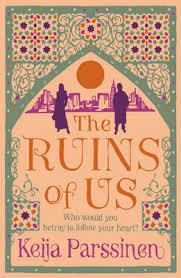

★★★★
It is 1615 and the years have not been kind to Aemilia Lanyer. Once, she and her poetry were celebrated at Court but, since the accession of James I, with his dislike of educated women, Aemilia has been forced to live a meaner existence. Now, weighed down with the debts of her dead husband, she ekes out her days in Clerkenwell with her teenage son Hal. It is Hal who offers Aemilia some unexpected distraction from her financial woes. As a young musician at Court, he happens to see the rooms of the late Arbella Stuart being cleared. Remembering that his mother once knew this unfortunate princess, he brings home a bundle of old papers destined for the fire, little realising what a treasure he has found. For this is Arbella’s account of her own life: the tale of a woman who dared to dream beyond the confines in which circumstances kept her. Faced with the words of this almost-friend, a woman she never truly understood, and one whom she inadvertently betrayed, Aemilia longs to finally learn the truth about Arbella Stuart.
Having read about this novel on Helen’s blog just before Christmas, I’ve seen it mentioned in several other places since, always with the greatest admiration. I was attracted by the idea of a book set at the turn of the 17th century which focused in on more unusual characters and also promised to teach me more about the history of the period. Both Aemilia and Arbella were real women, although neither was familiar to me (beyond a vague awareness of Sarah Gristwood’s biography of Arbella). As you know, I’m always keen to learn more about women who transcended or challenged the expectations of their time, and both of our protagonists fit that definition. Written with care and sensitivity, Fremantle’s book brings them both back to vivid life.
Arbella Stuart is aware from childhood that she is special, marked out as the presumptive heir of her cousin Elizabeth I. Raised under the eagle eye of her grandmother, the formidable Countess of Shrewsbury (Bess of Hardwick), she is educated as befits a queen. But she is also imprisoned. Arbella is a valuable pawn and, if she fell into the wrong hands, she could easily be set up as the figurehead for a coup: most dreaded of all, a Catholic coup. The Catholics are both the danger and the fascination of Arbella’s life – their threats rendering her own existence precarious, as her favour ebbs and flows, but their appeal embodied by certain overwhelming figures, like the ill-fated Mary of Scotland who passed her final years under the guard of Arbella’s step-grandfather. And so everything Arbella does is watched and weighed, whether that’s at home at Hardwick under Bess’s unforgiving eye, or at Court, where her success is charted by avid and envious eyes. On the face of it, Arbella’s life is all splendour. But within, it’s a different story. A lonely child, she has never known her parents and has had little affection from her demanding grandmother. Shut away in Bess’s great glass mansion, isolated by her surroundings as well as her natural reticence, she never learns to make friends. A queen is not supposed to have friends, after all. But Arbella is only human and, as the years go on and her fortunes are buffeted from one side to another, she begins to cry out for warmth – and love.
Aemilia Lanyer’s fate intertwines with Arbella’s from the child’s first arrival at Court. Older and wiser than Arbella, Aemilia is also an orphan but has found love elsewhere. She becomes famous not only for her poems, which reimagine mythological and biblical situations through the eyes of their maligned women, but for her own love life. Scandalously, she is the lover of a lord three times her age and, later, the mother of his bastard child, wedded off to a resentful husband whose peace is bought with swiftly-squandered money. But Aemilia makes do. Her family have been musicians for generations and she knows the fickle winds of courtly favour. And perhaps it’s because of this that she feels drawn to Arbella – serious, self-contained, over-educated and painfully shy – finding some comfort in an intense correspondence about poetry and literature. But now, years later, Aemilia’s memories are overlaid with a crippling sense of guilt. Did she do enough to help Arbella? Could she have done any more?
Fremantle’s story raises sobering points about female agency and independence – or the limits thereof – in Elizabethan and Jacobean England. She is excellent at conveying Arbella’s frustration at being kept as a child long beyond her time, and the ways that she misguidedly tries to take control of her situation. I’m not able to judge how historically accurate the book is, not knowing anything about either woman beyond what I read it, but I enjoyed Fremantle’s historical note at the back of the book and it looks as though she’s really done her research and tried to show both woman honestly. Through their eyes, we see England at a liminal period, between the waning grandeur of the Tudor age and the clumsier, ultimately tragic Stuart monarchy. Of course, our view is narrow because the two women work in very circumscribed worlds – we don’t see much of the world beyond the home and the court, but that in itself says much about how women were restricted – even brilliant women like these two. Poignant and thought-provoking, it’s an engaging read.
I’m now very keen to read Gristwood’s biography, to learn more about Arbella, and I’d also like to read more about Aemilia Lanyer. I hear that some people claim her as Shakespeare’s Dark Lady – but does anyone know of a biography and perhaps even a place where I can read some of her poetry? What do people think of Fremantle’s other novels too? I haven’t read either, but I think the characters from those other books threw a long shadow here, with Katherine Grey and Penelope Devereux both making appearances.
Buy the book
I received this book from the publisher via Netgalley in exchange for a fair and honest review
Share this:




